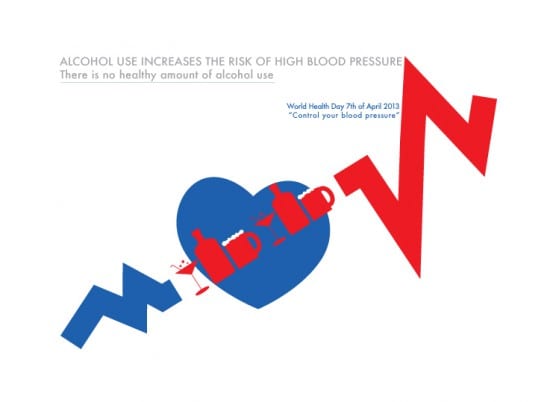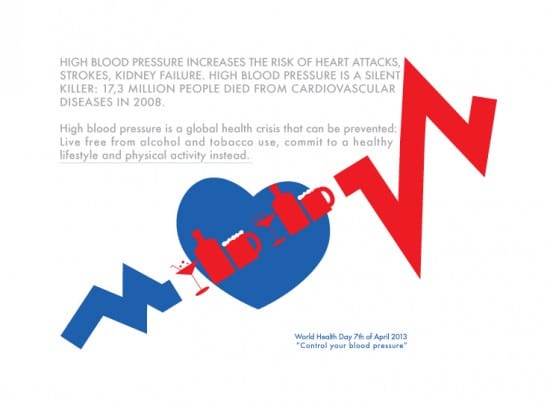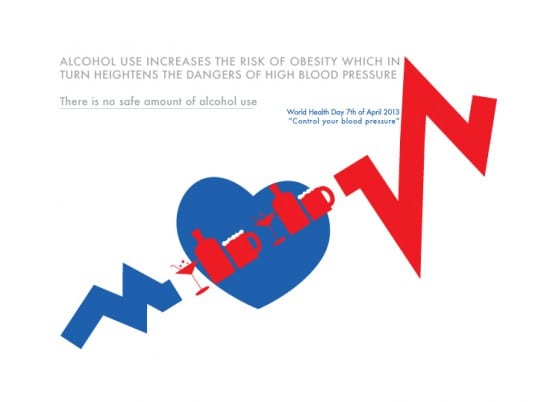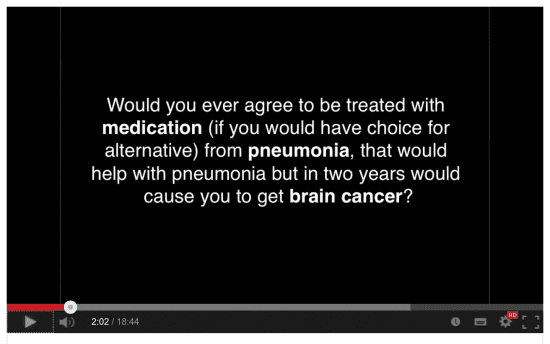It’s World Heart Day and this year’s theme addresses the importance of a life-course approach to the prevention and control of cardiovascular disease (CVD) with a focus on women and children. It’s an important opportunity to point to the fact of alcohol harming the sustainable functioning of the heart.
The overall campaign on World Heart Day aims to highlight what actions can be taken through a person’s life to reduce their risk of CVD. Obviously living free from alcohol is an essential action, concrete, and high-impact also on other aspects of life and well-being.
That brings me to address two alcohol-related issues in this context:
- Alcohol use’s negative impact on the heart.
- The myths about alcohol’s (in “moderate” use) positive effect on the heart.
When it comes to the harm caused by alcohol use to the heart, we had prepared three images for this year’s World Health Day (April 7, 2013) to illustrate the impact.
3 graphics telling the story
I’ll post them here for you again, because they illustrate clearly what can concretely be done to prevent heart disease.

A healthy lifestyle is about living alcohol free.
It helps prevent heart disease and stroke, as well as high-blood pressure – especially over the life course.
Today we have an opportunity to prevent the future impact of heart disease and stroke by adopting heart-healthy lifestyle patterns and lifestyle choices from childhood throughout adulthood.
The alcohol industry is targeting children and young people to make them start using alcohol earlier and earlier because it means more profits for Big Alcohol. For kids it means higher risks of obesity, high-blood pressure and other heart conditions.

There’s plenty of evidence showing the detrimental impact of alcohol use on the heart and on blood pressure.
Busting myths
But as we all know there’s also a huge myth out there, that alcohol in “moderate” amounts is healthy for the heart. So, it’s a good opportunity for me today, on World Heart Day, to take a look at that one, too. In the hyperlink above I refer to the website of the World Heart Federation. On their page about “Cardiovascular disease risk factors” (alcohol among them) it says, too: “Having one to two alcohol drinks a day may lead to a 30% reduction in heart disease, but above this level alcohol consumption will damage the heart muscle.”
There’s the myth!
Today’s World Heart Day is about living a lifestyle of healthy choices to prevent heart disease, but surely also any other disease. Therefore, it’s good to remind everyone – especially the World Heart Federation – that there’s no amount of safe alcohol use. The first drop causes cancer because ethanol is a carcinogenic. Just check out the TEDx talk:
He is making several great points, but for me in this context the most crucial one is that he points out the strangeness of emphazising alcohol’s (in so called “moderate” use) positive health impact when it brings with it a number of health risks and causes a vast number of diseases and conditions, including cancer.
Already at this point the health community – including the World Heart Federation – should finally move beyond doing the work for Big Alcohol in promoting alcohol as healthy.
But we can go further and actually question the whole claim about health benefits from alcohol use. There are more and more independent scientists looking into the mythical effects of alcohol. One among them is Hans Olav Fekjær. He wrote an article in Addiction last December examining the widely believed claims about alcohol’s (in so called “moderate amounts”) protective effects on health.
His initial curiosity might seem weird to most of us living deep within the alcohol culture but Mr. Fekjær says: “The weird part is not that I reflect about this, but that so many do not.”
The short abstract of his article called: “Alcohol—a universal preventive agent? A critical analysis” states:
In observational studies, moderate drinking is associated with a reduced risk of more than twenty different diseases and health problems. However, it would be premature to conclude that there is a causal relationship […]
It was found that reasons for questioning the causal association of moderate drinking and a reduced health risk are: the lack of dose-response relationships; the characteristics and lifestyles of today’s abstainers and moderate drinkers; the lack of plausible biological mechanisms; the problems in the classification of drinking groups, and; the general limitations of observational studies.”
Fueling your engine properly
I think that the human heart is the life engine, never taking any rest, or a day off. It deserves to be treated as well as possible, which is what World Heart Day is all about I guess. In this spirit the focus on lifestyles that prevent health conditions and diseases like cardiovascular diseases is right, moral and ethical.
Living alcohol free is obviously important, of course together with other aspects of a healthy life – like a lot of physical activity, time on fresh air, a diverse social environments, healthy and balanced diets. And as I think about those factors, I realize those are all things that parents make sure apply to their own children.
In his article Mr. Fekjær concludes with two statements:
The evidence for the harmful effects of alcohol is undoubtedly stronger than the evidence for beneficial effects.
Taken together, the existing evidence does not seem to meet the criteria for inferring causality […] For almost all the diseases, we do not know of any plausible biological mechanism explaining a causal preventive role for alcohol.”
Alcohol causes cancer and should not be recommended for any health benefit. But the pressure is mounting on the myth itself about alcohol’s magic health benefits if used in “just the right amount”.
From today’s World Heart Day with the call for addressing “the importance of a life-course approach to the prevention and control of cardiovascular disease (CVD)” alcohol should become a matter of heart – but not its mythical, magical image promoted and build up by the global alcohol industry; alcohol should be a matter of heart because it causes harm to all organs of the human body and because there’s no safe or healthy amount of alcohol use.
—
For more reading:
“Why alcohol has this negative effect on all elements of our health could be down to acetaldehyde – the product alcohol is broken down into in the body. Acetaldehyde is toxic and has been shown to damage DNA.” BBC News article “What damage does alcohol do to our bodies?” by Philippa Roxby Health reporter
“Alcohol—a universal preventive agent? A critical analysis“, in Addiction, by Hans Olav Fekjær, Actis, Oslo, Norway


